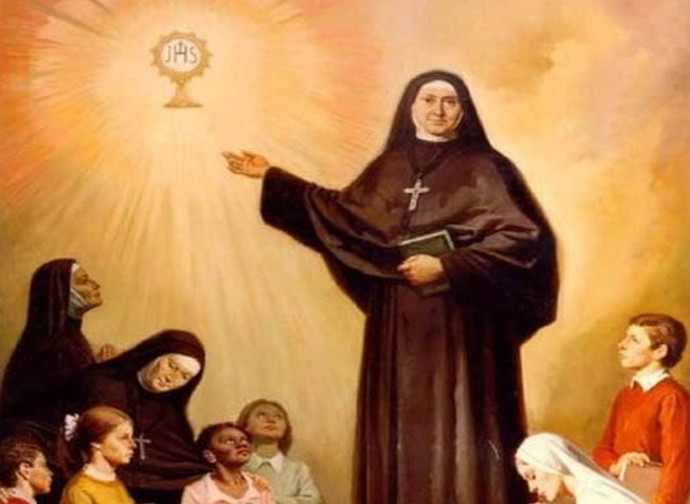Saint Geltrude Comensoli
The Eucharist was "Heaven on earth" to Saint Geltrude Comensoli (1847-1903), founder of the Institute of the Sacramentine Sisters which was consecrated to the perpetual adoration of the Blessed Sacrament and born from her love for Christ.

The Eucharist was "Heaven on earth" to Saint Geltrude Comensoli (1847-1903), founder of the Institute of the Sacramentine Sisters which was consecrated to the perpetual adoration of the Blessed Sacrament and born from her love for Christ. Worshipping God in the Eucharistic Presence was the source of Geltrude's charity and the constant object of her meditations, which were often addressed to the mysteries of the Rosary: "The first adoration began at the cave in Bethlehem. The Holy Virgin and Saint Joseph prostrated themselves for the first time before the Most Holy Humanity of the Incarnate Word". The fifth of ten children, seven of whom died in their infancy, Saint Geltrude was born in Bienno, a small town near Brescia [Northern Italy], and was baptised, on the day of her birth, with the name of Catherine. As she wrote in her diary, when she was five Jesus instilled in her heart, "a great desire to love Him much, and He kept teaching me what I had to do to please Him and be His own".
The little girl often meditated on the sacrifice of Christ ("I'm thinking", she replied when asked what she was doing) and on the sense of sin, the horror of which she could perceive through her intimate union with God. At seven years old, in fact, she was told by her mother that it was time for her first Confession: "I was astonished, and replied that I had been going to Confession every Saturday for some time". Moreover, if she managed to avoid being noticed, she would go "even more often, not wanting my soul to be full of sins". A year earlier, burning with the desire to approach the Blessed Sacrament, Catherine got up at dawn and went to the nearby church, where "the Priest gave me Communion; nobody saw me. Impossible to describe those moments in writing..." On the morning of that secret First Communion, she made a vow of virginity to Jesus.
The thought of God left alone in the tabernacle for long hours, without anyone to keep Him company, soon became the girl's missionary thrust: "Jesus, to love you and cause you to be loved,"was the foundation of her faith, which she tried to transmit to her friends. At the age of twenty she joined the Secular Ursulines of the Company of Saint Angela Merici. She became the novices' teacher but then, due to her father's illness and her family's financial difficulties, she took up work as a domestic servant. Several other experiences followed in various Lombard cities, where she demonstrated her talent as an educator. In 1880 Catherine managed to speak with Leo XIII, who suggested that she combine the education of young working women with the primary aim of Eucharistic adoration. Two years later, in Bergamo, she met Fr Francesco Spinelli (now a saint), who supported her in founding the Congregation of the Sacramentine Sisters.
There was no shortage of adversity in the Congregation's early years, including a financial crisis that threatened its very existence. But the Saint, who in the meantime had assumed the religious name of Geltrude, once again entrusted herself to the Lord: "Your will, not mine: I am not seeking myself, no, but the pure glory of my God". The Institute recovered and in 1900 received pontifical recognition, followed six years later by its definitive approval. It was like the Resurrection after the Cross. Together with love for the Eucharist, the Cross and Resurrection would form the core of her writings, which abound with mystical experiences that shed light on the value of suffering offered to God and the need to turn to Him to overcome minor and major trials, including temptation against faith and the virtues. Geltrude wrote: "I want to be a saint, to become a faithful image of the Crucified One, my only Good."
